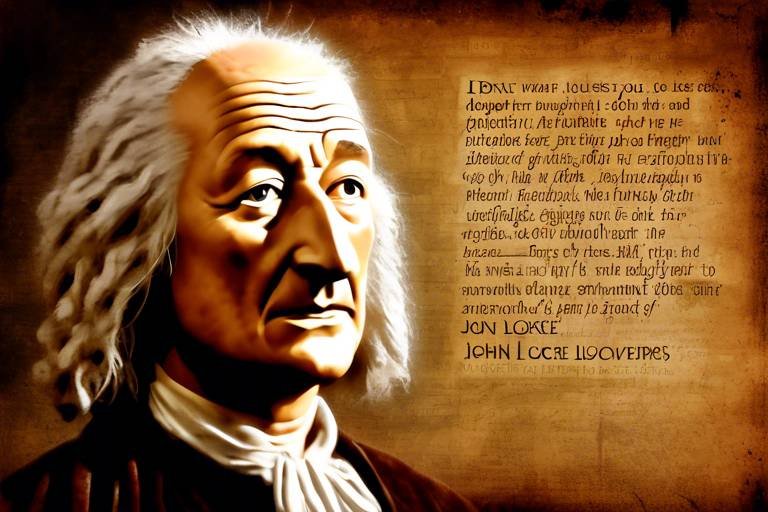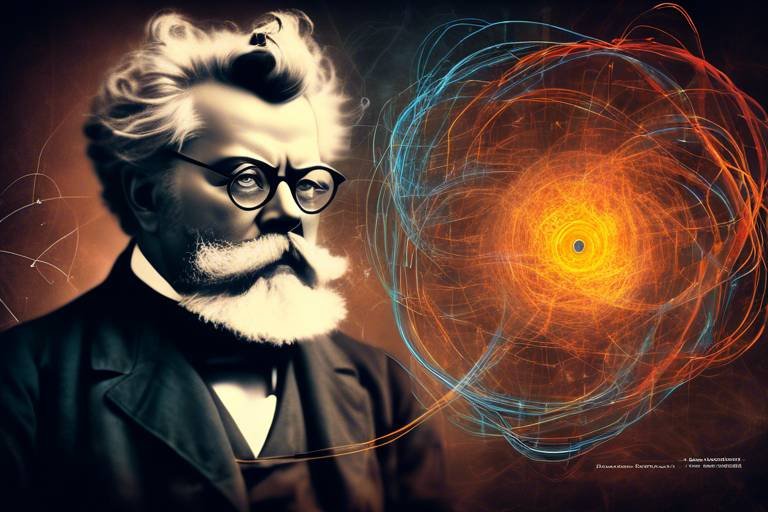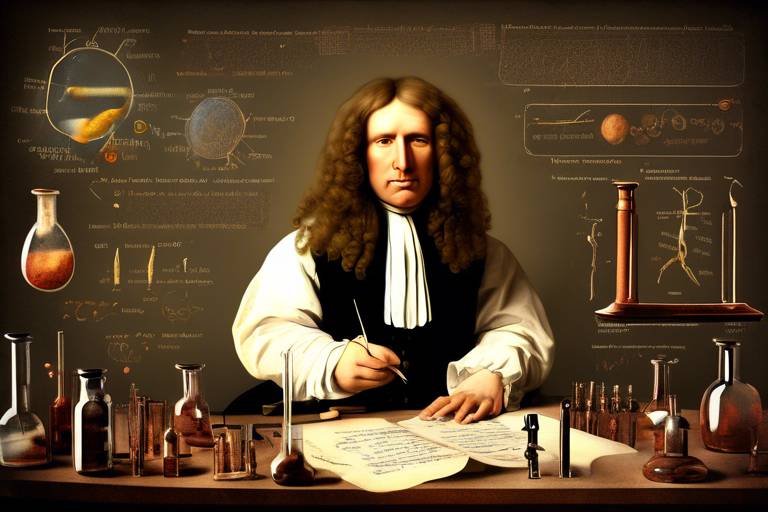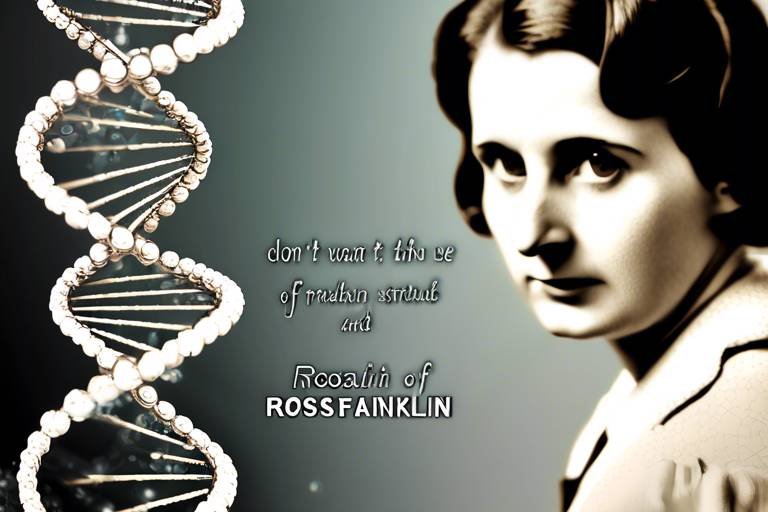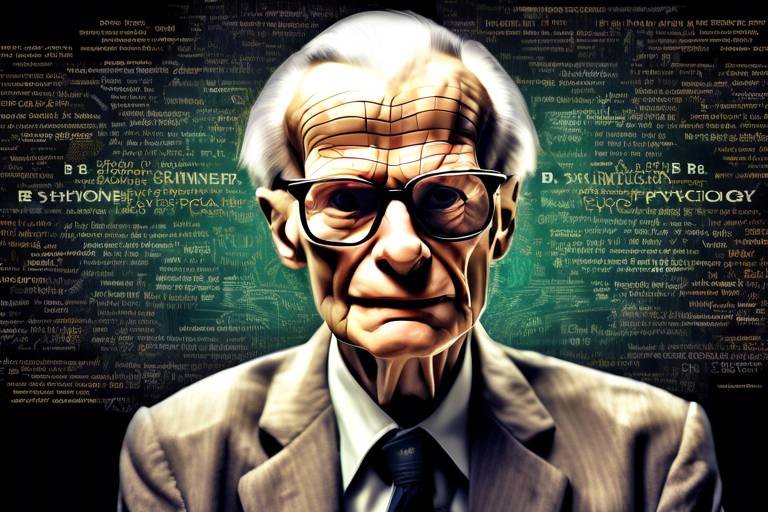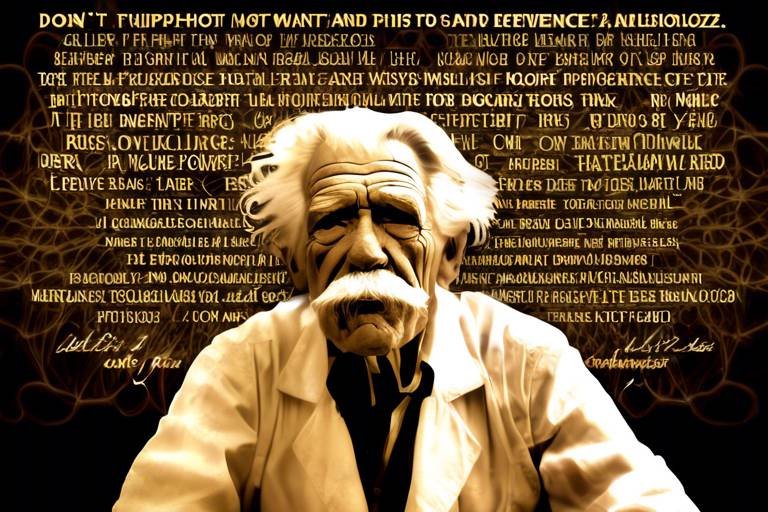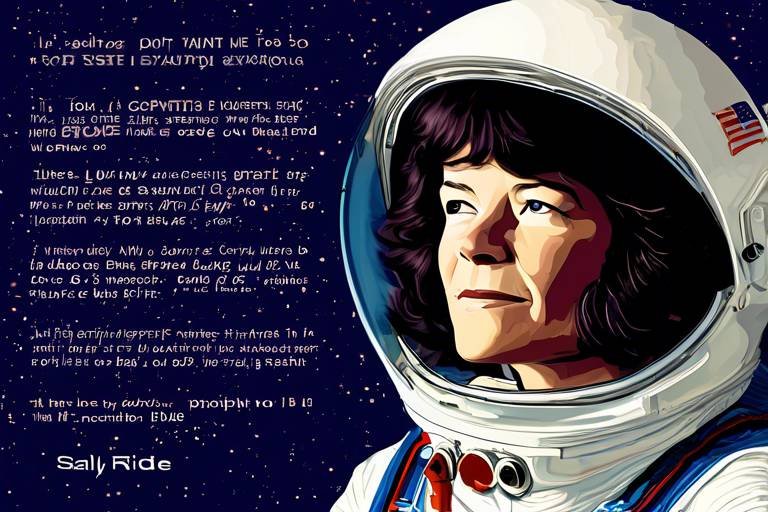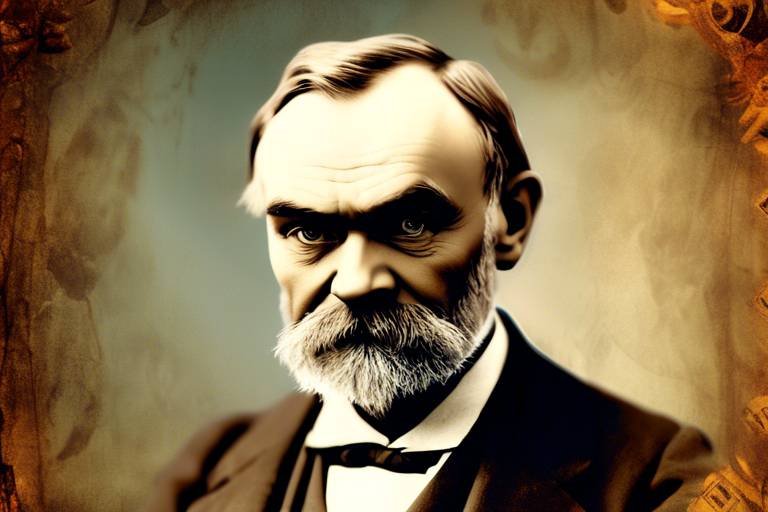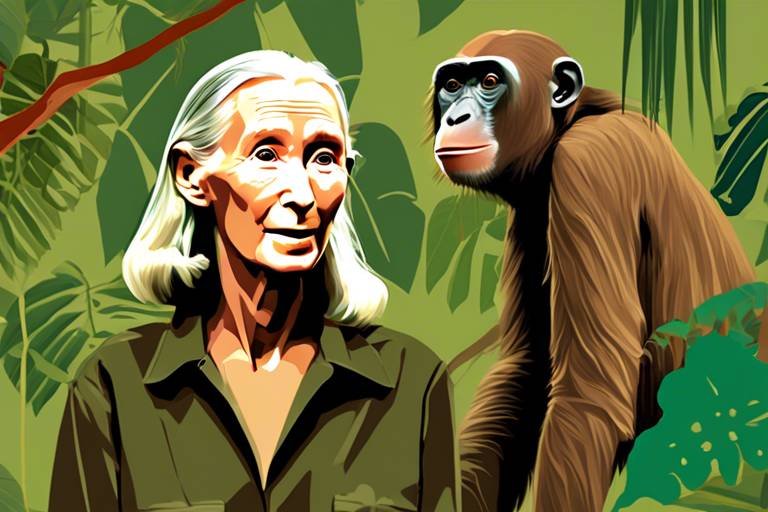The Discoveries of John Locke in Philosophy and Science
John Locke, a pivotal figure in the realm of philosophy and science, has left an indelible mark that continues to shape our understanding of knowledge, government, and human existence. Born in 1632, Locke's ideas emerged during a time of significant intellectual upheaval, challenging established norms and offering fresh perspectives that resonate even today. His contributions are not merely historical footnotes; they are the bedrock of modern thought, influencing everything from political theory to educational practices.
Locke's approach to knowledge was revolutionary. He dared to question the rationalist views that dominated his time, proposing instead that our understanding of the world is fundamentally rooted in experience. This emphasis on empiricism laid the groundwork for the scientific method we cherish today. Imagine embarking on a journey where every observation serves as a stepping stone to greater understanding—this was Locke's vision. He argued that ideas are not innate but are instead formed through our interactions with the world around us, challenging the notion that we are born with pre-existing concepts.
One of Locke's most famous theories is the concept of tabula rasa, or the "blank slate." He posited that individuals enter the world devoid of innate ideas, suggesting that all knowledge is acquired through experience. This notion was revolutionary, reshaping educational practices and psychological theories by emphasizing the importance of nurturing a child's environment. Picture a blank canvas waiting to be painted; Locke believed that our experiences are the colors that fill our minds with knowledge and understanding.
Locke's influence extends beyond the realms of knowledge and education; he also made significant contributions to political philosophy. His social contract theory argued that governments derive their authority from the consent of the governed. This idea was radical for its time and laid the groundwork for democratic thought. The notion that the power of rulers is contingent upon the will of the people has become a cornerstone of modern political systems. How profound is it to think that the very structure of our governments is rooted in Locke's ideas?
Moreover, Locke championed the concept of natural rights, asserting that individuals possess inherent rights to life, liberty, and property. This philosophy not only influenced the Enlightenment thinkers who came after him, such as Rousseau and Voltaire, but also laid the foundation for contemporary discussions on human rights. His ideas ignited a flame that fueled revolutions and the birth of modern democracy, reminding us that our rights are not granted by governments but are intrinsic to our humanity.
Locke's impact on education is another area where his influence is palpable. He advocated for a system that promotes experiential learning and critical thinking, encouraging a nurturing environment that fosters curiosity and personal development. In contemporary educational philosophies, we see echoes of Locke's ideas, emphasizing the importance of engaging with the material and learning through experience rather than rote memorization.
Locke's critique of innate ideas was a bold challenge to the prevailing beliefs of his time. He argued for a more empirical approach to understanding human cognition, suggesting that knowledge is built upon the foundation of experience rather than handed down at birth. This perspective not only reshaped philosophical discourse but also paved the way for advancements in psychology and cognitive science.
The legacy of John Locke endures in modern philosophy, where his ideas continue to be debated and integrated into various fields, including ethics, political theory, and cognitive science. His contributions to science, particularly in psychology and biology, emphasized the importance of observation and experimentation, reinforcing the empirical methods that are foundational to the scientific revolution.
- What is John Locke known for?
John Locke is primarily known for his contributions to philosophy, particularly his theories on empiricism, the social contract, and natural rights.
- How did Locke influence modern education?
Locke's emphasis on experiential learning and critical thinking has significantly shaped contemporary educational philosophies, advocating for environments that nurture curiosity.
- What is the social contract theory?
Locke's social contract theory posits that governments derive their authority from the consent of the governed, a fundamental principle of modern democracy.
- What are natural rights according to Locke?
Locke argued that individuals have inherent rights to life, liberty, and property, which are not granted by governments but are intrinsic to humanity.

Locke's Empiricism
John Locke's empiricism is a cornerstone of his philosophical work, fundamentally reshaping how we understand knowledge and its acquisition. Unlike the rationalists, who believed in innate ideas and the power of reason alone, Locke proposed that all knowledge originates from sensory experience. Imagine your mind as a blank canvas; every experience, every sensation, and every interaction adds a stroke of color, creating a vibrant picture of understanding. This idea was revolutionary, as it challenged the established norms of his time and laid the groundwork for modern scientific inquiry.
Locke argued that our senses are the primary source of information about the world. He famously stated, "Nothing is in the intellect that was not first in the senses." This means that to comprehend any concept, we must first encounter it through our senses. Think of it like learning to ride a bike; you can read all the manuals in the world, but until you feel the handlebars and balance on two wheels, you won't truly understand what it means to ride. Locke's emphasis on experience as the foundation of knowledge opened the door to a more empirical approach in both philosophy and science.
His ideas contributed significantly to the development of epistemology, the branch of philosophy concerned with knowledge. By advocating for a method of inquiry based on observation and experience, Locke influenced not just philosophers but also scientists. The scientific method, which relies heavily on empirical evidence, can trace its roots back to Locke's assertions. In fact, many of his principles can be summarized in a few key points:
- Knowledge is derived from experience: All ideas come from what we perceive through our senses.
- Rejection of innate ideas: Locke firmly believed that individuals are not born with pre-existing notions; everything is learned.
- Importance of reflection: While sensory experience is crucial, Locke also acknowledged the role of reflection in processing those experiences.
Through his work, Locke not only challenged the intellectual elite of his time but also provided a framework that encouraged future generations to question and explore the nature of knowledge. His empiricism is a vital part of the discourse in modern philosophy and science, where the emphasis on observation and experimentation remains paramount. Locke's legacy, therefore, is not just a historical footnote; it is a living, breathing part of our quest for understanding the world around us.

Tabula Rasa: The Blank Slate Theory
John Locke's concept of tabula rasa, or the "blank slate" theory, is a cornerstone of his philosophy that revolutionized the understanding of human knowledge and development. Imagine a newborn baby, a clean slate waiting to be written upon. This vivid metaphor encapsulates Locke's assertion that individuals are not born with pre-existing ideas or knowledge; instead, they enter the world as blank slates, ready to be shaped by experience.
Locke argued that all knowledge originates from experience, which can be categorized into two types: sensation and reflection. Sensation refers to the information we gather through our senses—what we see, hear, touch, taste, and smell. Reflection, on the other hand, involves the mind's ability to process these sensory experiences, leading to new ideas and understanding. This framework challenged the prevailing notion of innate ideas, proposing instead that our environment and experiences play a pivotal role in shaping who we are.
This revolutionary idea had profound implications, not just for philosophy but also for education and psychology. By advocating for a system where knowledge is acquired through experience, Locke laid the groundwork for modern educational practices that emphasize hands-on learning and critical thinking. The notion that students should engage with their environment and learn through doing rather than merely memorizing facts resonates strongly in today's educational philosophies.
Moreover, Locke's blank slate theory suggests that individuals can be molded by their experiences, which opens up discussions about the impact of upbringing, culture, and education on personal development. This perspective emphasizes the importance of providing supportive and enriching environments for children, as these experiences will ultimately shape their understanding of the world. In essence, Locke's ideas encourage us to consider how we can foster curiosity and critical thinking in future generations.
To illustrate Locke's theory further, consider the following table that outlines the key aspects of tabula rasa:
| Aspect | Description |
|---|---|
| Definition | The idea that individuals are born without innate ideas. |
| Types of Knowledge | Sensation and Reflection |
| Implications for Education | Emphasis on experiential learning and critical thinking. |
| Impact on Development | Highlighting the role of environment and experience in shaping individuals. |
Locke's blank slate theory not only reshaped philosophical discourse but also paved the way for future thinkers to explore the complexities of human cognition and behavior. By asserting that knowledge is not innate but rather acquired through experience, Locke challenged the status quo and encouraged a more empirical approach to understanding humanity. This shift in perspective remains relevant today as we continue to explore the intricate relationship between experience, learning, and personal development.
- What is tabula rasa? Tabula rasa is a concept introduced by John Locke, suggesting that individuals are born without innate ideas and that knowledge is acquired through experience.
- How did Locke's theory influence education? Locke's theory emphasized the importance of experiential learning, leading to modern educational practices that focus on hands-on experiences and critical thinking.
- Why is the blank slate theory significant? The blank slate theory challenged the notion of innate ideas, influencing various fields, including psychology, education, and philosophy, by highlighting the role of experience in shaping individuals.

Social Contract Theory
John Locke's is one of the cornerstones of modern political philosophy. Imagine a world where everyone acts solely on their own whims, with no rules or agreements to guide behavior. Sounds chaotic, right? Locke stepped in to propose a different vision: a society built on mutual consent and shared governance. In his view, the legitimacy of government arises not from divine right or force but from the agreement of the governed. This revolutionary idea was a breath of fresh air in the 17th century, a time when monarchies held absolute power.
Locke believed that individuals possess certain natural rights—life, liberty, and property—that must be protected by the government. This was a dramatic shift from the idea that kings had the authority to rule without question. Instead, Locke argued that people enter into a social contract to form a government that safeguards these rights. If the government fails to do so, citizens have not just the right but the obligation to revolt. It’s like signing a contract with a service provider; if they don’t deliver, you’re entitled to seek alternatives. This notion of accountability is what set Locke apart from his contemporaries.
Locke's theory can be broken down into several key components:
- Consent: The foundation of any legitimate government is the consent of the governed. People agree to form a society and abide by its rules.
- Protection of Rights: The primary role of government is to protect the natural rights of its citizens.
- Right to Revolt: If a government fails to protect these rights, the people have the right to overthrow it.
This framework not only influenced political thought but also laid the groundwork for modern democratic systems. Locke's ideas resonated deeply with Enlightenment thinkers, who expanded on them and incorporated them into their own philosophies. For instance, the American Declaration of Independence echoes Locke's sentiments by emphasizing the importance of individual rights and the government's responsibility to protect them.
In essence, Locke's Social Contract Theory is a powerful reminder that the legitimacy of authority stems from the people it governs. It invites us to reflect on our own social contracts today. Are our governments fulfilling their promises? Are we, as citizens, engaged enough to hold them accountable? These questions remain relevant, as Locke's ideas continue to shape our understanding of justice, governance, and individual rights.
- What is the Social Contract Theory?
The Social Contract Theory is a political theory that suggests that individuals consent, either explicitly or implicitly, to form a government that protects their rights and maintains social order. - How did John Locke influence modern democracy?
Locke's ideas about natural rights and government accountability influenced Enlightenment thinkers and were foundational in the development of democratic principles, including the right to revolt against unjust governments. - What are natural rights according to Locke?
Natural rights, as outlined by Locke, include the rights to life, liberty, and property—fundamental rights that should be protected by any legitimate government.

Natural Rights
John Locke's philosophy is often celebrated for its profound impact on the concept of , which are the fundamental rights that every individual possesses simply by being human. Locke argued that these rights are not granted by any government or authority; rather, they are inherent and universal. The essence of Locke's argument can be distilled into three primary rights: life, liberty, and property. These rights form the cornerstone of his political philosophy and have significantly influenced modern democratic thought.
Locke's assertion that individuals have a natural right to life means that every person has the right to live freely without interference from others. This idea was revolutionary at the time, as it challenged the divine right of kings and the idea that rulers had absolute power over their subjects. Similarly, the right to liberty emphasizes the importance of individual freedom, allowing people to make choices about their lives without undue restraint. Finally, the right to property is particularly noteworthy; Locke believed that individuals have the right to own and control their possessions, which he saw as a natural extension of their labor and efforts.
These natural rights are not merely theoretical constructs; they have practical implications for governance. Locke posited that the primary role of government is to protect these rights. If a government fails to do so, he argued, the people have the right to revolt and establish a new government that will uphold their rights. This radical idea laid the groundwork for the American Revolution and the development of modern democracies around the world. In fact, the Declaration of Independence echoes Locke's principles, asserting that all men are created equal and endowed with certain unalienable rights.
Moreover, Locke's ideas on natural rights have been instrumental in shaping contemporary discussions around human rights. These rights are now recognized globally, enshrined in various legal frameworks and declarations, such as the Universal Declaration of Human Rights. Locke's insistence that these rights are inherent to all individuals, regardless of their background or circumstances, underscores the importance of equality and justice in modern society.
In conclusion, Locke's contributions to the concept of natural rights have had a lasting impact on political philosophy, human rights, and democratic governance. His belief that individuals possess inherent rights to life, liberty, and property continues to resonate today, reminding us that the protection of these rights is essential for a just and equitable society.
- What are natural rights? Natural rights are inherent rights that every individual possesses, such as the rights to life, liberty, and property.
- How did Locke influence modern democracy? Locke's theories on natural rights and the role of government greatly influenced the development of democratic thought and practices, particularly during the American Revolution.
- Are natural rights recognized globally? Yes, natural rights have been recognized and enshrined in various international human rights documents, promoting the idea that these rights are universal.

Influence on Enlightenment Thinkers
John Locke's influence on Enlightenment thinkers cannot be overstated; he was a beacon of reason and a catalyst for change during a time when society was ripe for new ideas. His philosophies, particularly regarding empiricism and the social contract, provided a foundation that many Enlightenment philosophers built upon. Thinkers such as Jean-Jacques Rousseau and Voltaire drew heavily from Locke's theories, using them to challenge existing norms and advocate for individual rights and freedoms.
Locke's assertion that knowledge is derived from experience resonated deeply with Enlightenment ideals, which emphasized reason and observation over tradition and blind faith. This shift in perspective encouraged a wave of intellectual exploration that questioned the status quo. For instance, Rousseau, who admired Locke's views on education and human nature, expanded on the idea of the noble savage, arguing that human beings are inherently good but corrupted by society. This concept was a direct reflection of Locke's belief in the potential for human growth and development through experience.
Moreover, Locke's idea of the social contract, which posited that governments should be based on the consent of the governed, laid the groundwork for the democratic movements that emerged during the Enlightenment. This notion inspired Voltaire, who championed civil liberties and criticized authoritarian regimes. The ripple effect of Locke's ideas can be seen in the American Revolution and the French Revolution, where Enlightenment thinkers used his concepts to advocate for a government that respects individual rights and freedoms.
To illustrate the profound impact Locke had on his contemporaries, consider the following table that highlights key Enlightenment thinkers and their connections to Locke's philosophies:
| Thinker | Connection to Locke |
|---|---|
| Jean-Jacques Rousseau | Expanded on the idea of the social contract and human nature, emphasizing the importance of experience. |
| Voltaire | Advocated for civil liberties and criticized tyranny, inspired by Locke's ideas on government and rights. |
| Montesquieu | Utilized Locke's principles to argue for the separation of powers in government. |
| Thomas Jefferson | Incorporated Locke's ideas on natural rights into the Declaration of Independence. |
In summary, Locke's contributions to Enlightenment thought were not just influential; they were transformative. His ideas ignited a spark that led to a broader questioning of authority and paved the way for modern democratic principles. The Enlightenment was a time of great upheaval and rethinking, and John Locke was at the heart of it all, encouraging people to seek knowledge and understand their rights as individuals.
- What is John Locke best known for?
John Locke is best known for his theories on empiricism, the social contract, and natural rights, which significantly influenced modern political philosophy and education.
- How did Locke influence the Enlightenment?
Locke's ideas on knowledge, government, and individual rights inspired many Enlightenment thinkers, encouraging them to challenge traditional authority and advocate for democracy.
- What is the significance of the social contract theory?
The social contract theory posits that governments derive their authority from the consent of the governed, which is foundational to modern democratic thought.

Locke's Impact on Education
When we think about education today, it’s hard not to acknowledge the profound influence of John Locke. His ideas have shaped not just the way we teach, but also how we understand the process of learning itself. Imagine walking into a classroom where the focus is entirely on rote memorization, devoid of any engagement or curiosity. Now, contrast that with a lively environment where students are encouraged to explore, ask questions, and connect their learning to real-world experiences. This transformation in educational philosophy can largely be traced back to Locke's revolutionary thoughts.
At the heart of Locke's educational theory is the concept of experiential learning. He argued that knowledge isn't just handed down from teacher to student; rather, it is built through experience. This notion was radical for its time, as many educators believed in the transmission of fixed knowledge. Locke's emphasis on sensory experience as the primary source of knowledge paved the way for a more interactive and engaging educational model. He believed that children are not merely vessels to be filled with information but active participants in their own learning journey.
Locke also championed the importance of fostering curiosity and critical thinking. He encouraged educators to create an environment where questioning was not only welcomed but celebrated. This approach aligns closely with modern educational practices that prioritize inquiry-based learning. By allowing students to investigate and explore topics of interest, teachers can cultivate a passion for learning that lasts a lifetime. Imagine a classroom where students are not afraid to voice their opinions or challenge established ideas; that’s the legacy of Locke's educational philosophy.
Additionally, Locke's ideas on education emphasize the importance of moral development. He believed that education should not only focus on intellectual growth but also on the development of character. This holistic approach is reflected in today's educational systems that aim to nurture well-rounded individuals. In Locke's view, a well-educated person is one who possesses both knowledge and virtue, ready to contribute positively to society.
Locke's influence can also be seen in the structure of modern educational systems. His belief in the importance of a structured curriculum that adapts to the needs of students has led to the development of tailored educational experiences. Today, educators often employ differentiated instruction to meet diverse learning styles and paces, a concept that echoes Locke's advocacy for personalized learning.
To summarize, Locke's impact on education is multifaceted and enduring. His ideas have not only shaped teaching methods but have also influenced the broader understanding of what it means to learn. By advocating for experiential learning, critical thinking, and moral development, Locke laid the groundwork for modern educational philosophies that prioritize the student experience. As we continue to evolve our educational practices, Locke’s insights remain a guiding light, reminding us that education is not just about filling minds with facts, but about nurturing inquisitive, thoughtful, and capable individuals.
- What is Locke's view on education? Locke believed in experiential learning and the importance of nurturing curiosity and critical thinking in students.
- How did Locke influence modern educational practices? His ideas led to the development of inquiry-based learning and differentiated instruction, focusing on the needs of individual learners.
- Why is moral development important in Locke's educational philosophy? Locke advocated for the development of character alongside intellectual growth, emphasizing the role of education in shaping virtuous citizens.

Critique of Innate Ideas
John Locke's critique of innate ideas was a bold and revolutionary stance during his time. He challenged the prevailing notion that humans are born with pre-existing knowledge or concepts, a belief that was notably championed by rationalists like Descartes. Instead, Locke proposed that the human mind is akin to a blank slate (tabula rasa) at birth. This idea was not just a philosophical musings; it was a profound assertion that had implications for education, psychology, and even politics.
Locke argued that all knowledge originates from sensory experience. He believed that individuals derive their understanding of the world through their interactions with it, rather than through innate ideas that are supposedly hardwired into our minds. To illustrate this point, he used the analogy of a painter starting with a blank canvas. Just as a painter applies colors and shapes to create a masterpiece, humans acquire knowledge by experiencing the world around them. This perspective opened up new avenues for inquiry and understanding, emphasizing the importance of empirical evidence and observation.
In Locke's view, if innate ideas existed, then we would all possess the same concepts from birth. However, he pointed out that people from different cultures and backgrounds often have vastly different beliefs and understandings of the world. This diversity in thought suggests that knowledge is not inherent but rather acquired. Locke's critique led to a deeper examination of how we learn and understand, paving the way for modern educational theories that prioritize experiential learning.
Moreover, Locke's arguments against innate ideas also had significant ramifications for the realm of psychology. By asserting that knowledge comes from experience, he laid the groundwork for later developments in behavioral psychology, which focuses on observable behaviors rather than internal thoughts or instincts. This shift in focus underscored the importance of environment and experience in shaping human behavior.
Locke's critique can be summarized in a few key points:
- Empirical Foundation: Knowledge arises from sensory experiences.
- Diversity of Beliefs: Different cultures exhibit different ideas, indicating that knowledge is learned.
- Impact on Education: Emphasizes the need for experiential learning in educational practices.
- Influence on Psychology: Shifts focus from innate ideas to learned behaviors.
Through his critique of innate ideas, Locke not only challenged the intellectual status quo but also encouraged a more scientific approach to understanding human cognition and learning. His ideas resonate today, reminding us that curiosity and experience are at the heart of knowledge acquisition. In a world where information is constantly evolving, Locke's emphasis on the importance of learning through experience remains a guiding principle in both education and psychology.
What did John Locke mean by "tabula rasa"?
Locke's concept of "tabula rasa" refers to the idea that individuals are born without any innate knowledge or ideas. Instead, he argued that all knowledge is acquired through experience and sensory interaction with the world.
How did Locke's critique of innate ideas influence modern psychology?
Locke's emphasis on experience over innate ideas laid the groundwork for behavioral psychology, which focuses on observable behaviors and the impact of the environment on learning and development.
Why is Locke's critique of innate ideas significant in education?
His critique emphasizes the importance of experiential learning, advocating for educational practices that nurture curiosity and allow students to learn through their experiences rather than relying solely on preconceived notions.

Legacy in Modern Philosophy
John Locke's legacy in modern philosophy is nothing short of monumental. His ideas have not only shaped the course of philosophical thought but have also permeated various disciplines, including ethics, political theory, and cognitive science. Imagine a vast tree, with Locke as its sturdy trunk; the branches represent the diverse fields influenced by his notions of knowledge, governance, and human rights. Each branch grows in different directions, yet they all share a common root: the empiricist approach and the belief in the power of human experience.
Locke's emphasis on empiricism laid the groundwork for a new understanding of knowledge. He argued that knowledge is not something we are born with, but rather something that is acquired through experience. This idea has resonated through the ages, influencing philosophers such as David Hume and Immanuel Kant. Their works, which further developed Locke's ideas, helped to establish the framework for modern epistemology—the study of knowledge itself. In this way, Locke can be seen as a pivotal figure in the transition from medieval scholasticism to the Enlightenment, marking a significant shift in how we approach understanding the world.
Furthermore, Locke's thoughts on government and society have had a lasting impact on political philosophy. His notion of the social contract, where the legitimacy of authority is derived from the consent of the governed, has been fundamental in shaping democratic ideals. This concept not only influenced Enlightenment thinkers but also laid the groundwork for modern democratic systems. The echoes of his theories can be heard in the founding documents of many nations, where the principles of liberty and equality are enshrined.
In addition to political theory, Locke's advocacy for natural rights has left an indelible mark on contemporary discussions surrounding human rights. His assertion that individuals possess inherent rights to life, liberty, and property has become a cornerstone of modern human rights discourse. Today, we often refer to these rights as unalienable, meaning they cannot be taken away or denied. This idea has not only influenced legal frameworks but has also inspired countless movements advocating for social justice and equality.
Moreover, Locke's ideas extend into the realm of education. His belief in experiential learning and critical thinking has shaped educational philosophies that prioritize curiosity and personal development. In modern classrooms, we often see Locke's influence in practices that encourage students to engage with material actively, rather than passively absorbing information. This shift towards a more interactive and student-centered approach can be traced back to Locke's revolutionary ideas about how we learn and acquire knowledge.
In summary, the legacy of John Locke in modern philosophy is vast and multifaceted. His contributions have not only influenced philosophical thought but have also had profound implications across various fields. From shaping democratic ideals to influencing educational practices, Locke's ideas continue to resonate today, reminding us of the enduring power of human experience and rational thought.
- What is John Locke most known for? John Locke is most known for his contributions to empiricism, the social contract theory, and the concept of natural rights.
- How did Locke influence modern democracy? Locke's idea that governments derive their authority from the consent of the governed laid the foundation for modern democratic thought.
- What is the tabula rasa theory? The tabula rasa theory posits that individuals are born without innate ideas and that knowledge is acquired through experience.
- Why is Locke important in education? Locke emphasized experiential learning and critical thinking, advocating for an educational system that fosters curiosity and personal development.

Locke's Contributions to Science
John Locke, often hailed as the father of empiricism, made significant contributions to the realm of science that resonate even in contemporary discussions. His approach emphasized the importance of observation and experimentation, which laid the groundwork for the scientific methods we utilize today. Unlike many of his predecessors who relied heavily on rationalism and abstract reasoning, Locke believed that all knowledge originates from sensory experiences. This fundamental idea not only challenged the status quo of philosophical thought but also propelled scientific inquiry into a new era.
Locke's investigations extended beyond philosophy into various scientific fields, particularly psychology and biology. He posited that human understanding is shaped by experiences rather than innate ideas, which was a radical departure from the prevailing notions of his time. This perspective is akin to a painter starting with a blank canvas; each experience adds color and depth, creating a unique masterpiece of understanding. By advocating for a methodical approach to studying the mind and behavior, Locke set the stage for future psychologists to explore the intricacies of human cognition.
In his work, Locke emphasized the significance of empirical evidence and the necessity of questioning established beliefs. He argued that true knowledge is not merely handed down through tradition or authority but must be verified through experience. This insistence on evidence-based reasoning can be seen as a precursor to the scientific revolution, where experimentation became the cornerstone of discovery. Locke's influence is evident in the works of later scientists who adopted similar methodologies, ultimately transforming how knowledge is acquired and validated.
Moreover, Locke's contributions to science can be summarized in several key areas:
| Area of Contribution | Description |
|---|---|
| Psychology | Introduced the idea that experiences shape the mind, influencing early psychological theories. |
| Biology | Emphasized observation in studying living organisms, leading to advancements in biological sciences. |
| Empirical Methodology | Promoted the use of observation and experimentation as essential tools for scientific inquiry. |
Locke's emphasis on the scientific method cannot be overstated. He argued that knowledge should be built upon a foundation of observable facts, which is a principle that remains central to scientific investigation today. His belief in the importance of questioning and verifying knowledge has influenced countless scientists who strive to understand the world through rigorous testing and critical analysis.
In conclusion, John Locke's contributions to science were revolutionary and continue to shape our understanding of various disciplines. His insistence on empirical evidence and sensory experience as the basis of knowledge has paved the way for modern scientific thought. By challenging established norms and advocating for a more evidence-based approach, Locke not only transformed philosophy but also left an indelible mark on the scientific community.
- What is John Locke best known for in science? Locke is best known for his emphasis on empiricism, advocating that knowledge comes from sensory experience and observation.
- How did Locke influence modern psychology? His idea that the mind is shaped by experiences laid the groundwork for later psychological theories that focus on learning and development.
- What role did Locke play in the scientific revolution? Locke's insistence on empirical methods and questioning established beliefs significantly contributed to the emergence of the scientific revolution.
Frequently Asked Questions
- What is John Locke's theory of empiricism?
John Locke's empiricism emphasizes that knowledge comes from sensory experience. He argued that our understanding of the world is shaped by what we perceive through our senses, rather than being innate or pre-existing. This idea challenged rationalist views and laid the groundwork for modern scientific inquiry.
- What does the term 'tabula rasa' mean?
'Tabula rasa' translates to 'blank slate' in Latin. Locke proposed that individuals are born without any innate ideas, suggesting that all knowledge is acquired through experience. This revolutionary theory reshaped educational practices and psychological theories, emphasizing the importance of environment and learning.
- How did Locke's social contract theory influence modern democracy?
Locke's social contract theory posits that governments derive their authority from the consent of the governed. This idea significantly influenced democratic thought, asserting that political power should be based on the will of the people, which is foundational to many modern democratic systems.
- What are natural rights according to John Locke?
Locke championed the concept of natural rights, arguing that every individual possesses inherent rights to life, liberty, and property. These ideas laid the groundwork for contemporary discussions on human rights and have influenced legal frameworks around the world.
- Who were some Enlightenment thinkers influenced by Locke?
Locke's ideas inspired many Enlightenment thinkers, including philosophers like Rousseau and Voltaire. His work contributed to the intellectual climate that fostered revolutions and the emergence of modern democratic ideals.
- How did Locke's views impact education?
Locke emphasized experiential learning and critical thinking in education. He advocated for a system that nurtures curiosity and personal development, ideas that resonate strongly in contemporary educational philosophies.
- What was Locke's critique of innate ideas?
Locke challenged the prevailing belief in innate ideas by arguing for a more empirical approach to understanding human cognition. He believed that knowledge is not pre-existing but developed through experience and observation.
- What is Locke's legacy in modern philosophy?
The legacy of John Locke is profound in modern philosophy. His ideas continue to be debated and integrated into various fields, including ethics, political theory, and cognitive science, influencing contemporary thought significantly.
- What contributions did Locke make to science?
Locke's scientific inquiries, particularly in psychology and biology, emphasized observation and experimentation. His work reinforced the empirical methods that are foundational to the scientific revolution and continue to influence modern research practices.

